
Recently on Cyclingnews.com |
Tales from the travellers — the diary of Team Marco Polo
Hallucinating in Africa at the Tour du Faso
By Remko Kramer
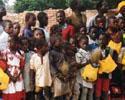 |
After victory in the 2002 Tour du Faso, the Marco Polo Cycling Club returned as defending champions. This stage race in Burkina Faso, Africa has become a legendary race. The circumstances are really hard, with temperatures around 40 degrees Celsius. The race is being organised by the Société du Tour de France in cooperation with the Burkinese Cycling Federation.
The publicity of this event is huge. Last year, a hour documentary of this event was broadcasted all over the world, including several national stations in Europe, Eurosport and OLN (USA). The team that raced in December last year in Hong Kong saw their teammates in the Tour du Faso on the Asian sports channel!
To Africa we go
We flew out from Paris to Ouagadougou, the capitol of Burkina Faso. At the airport we found out that two members of the team were not listed for this flight. The time of departure was getting near, but the check-in was still in full action. In the end, the two got their tickets and we boarded the plane, only to find out that they had checked in a few people too many!
So a few people including ourselves were taken by another plane to Marseille, were we had a "short" stop-over. Somewhere in the south of Tunis we had another stop for some fuel and with about six hours delay, we arrived in Burkina Faso in the evening. We met our Burkinese helper and Marco Polo member, Pascal Sawadogo at the airport. People from the Société du Tour de France welcomed us and took us to the hotel.
An Abdou from Burkina Faso?
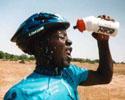 |
We all suffered in the first stage of the Tour du Faso. Last year's winner Joost Legtenberg lost several minutes to Saadoune from Maroc (last year's number two), who took the first stage victory. The Marco Polo team with Dutchmen Joost Legtenberg, Folkert De Haan, Maint Berkenbosch, Remko Kramer; Belgium Lionel Syne and Burkinabe Abdoulay Ouedragou had to accept the fact that Saadoune was way stronger then the rest of the field. Crosswinds and the heat made this first stage a very hard one. And we also found out that one day was not enough to acclimatise to the heat.
In the next days we aimed to concentrate on stage wins and try to help our Burkinese team mate Abdoulay. We call him Abdou, but his name is really the only thing that resembles to this former Uzbek sprinter. Our Abdou is a small. tiny guy that would certainly be a great climber, however, there are no mountains in Burkina Faso.
Halfway into the stage he came to me and said he had a problem. He held his shifter/brake in his hand on top of his handlebars. It had come loose from the handlebars and it was only attached to his bicycle with the cables, so he had no front brake anymore. I told him to be careful now, but he said he was used to having no brakes because sometimes there are no brake pads available in Burkina Faso. The rest of his (and many other Africans) bicycles were in the same state as his shifter - old and worn out - and on three spots the "paintjob" made room for some welding scars.
Camping out
The start of the second stage was in Ouagadougou. In the streets of Ouagadougou there were spectators lined up along the roads. People had climbed on houses, trucks and in trees to see the Tour du Faso pass by. Folkert had become sick during the night and was not feeling too good at all. We tried to keep him out of the wind and encouraged him to go on, because he was our best man on GC.
Tonight and for the next few days we stayed in a tent camp. Every team had a tent with mattresses at the ground. The camp is further equipped with open air shower cabins for after the stage and a complete travelling open air kitchen and restaurant.
In the night the stars are so bright here because there is almost no light from the cities. Sleeping in the tent, we heard many strange sounds from African animals and from people that sprint out of their tent and throw up.
|
Lying in bed... After the third stage I was so exhausted and sick. I tried to drink some more because I was also dehydrated from the race, but it was impossible. The next morning I woke up, felt really bad, but wanted to stay in the race. I had to eat something. I sat upright and waited a while. I drunk some water and had to run for the toilet. The Tour du Faso was over for me. The next two days I hardly noticed myself. Once every two hours I had to run to the toilet and the rest of the time I slept. Maint, who at this stage was a little less worse off, took care of me and made sure I had something to drink. The next two days I was more awake and got more and more worried. Eating was simply impossible and drinking was also not enough to keep up with the loss of fluid. Bert, the mechanic, then had to help both Maint and I since Maint had become sicker. Our only entertainment was a television with two channels, but every evening a report from the stage was the highlight of the day. One day there was a documentary of the Tour du Senegal and we saw a Senegalese win a stage in a Marco Polo jersey! This little bit of fun was also over after a few days when the television broke down. The air-conditioning had his own mind and changed temperature every once in a while. After four days I started to have weird ideas and sometimes I lost my sight or hearing. We called a doctor, he said I had a parasytair bacteria. He gave me four big pills that I had to take at once. The next morning I could eat a little bit, and the next day I could walk around a bit. This was good because now I had to take care of Maint and also Bert, who now had to run for the toilet as soon as he moved himself. Maint and Bert had to wait another three days before they received the right medication. This came just in time before the journey back home. |
Stage win
The next stage was going to be a hard one for Folkert, Maint and I; we could not eat breakfast and felt really bad. But this can happen in Africa and there is only one solution - race.
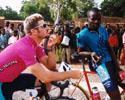 |
Maint had big problems and had to give up before he fell off his bicycle from dizziness. I could roll along in the field but felt like I was in a movie; Folkert also stayed in the bunch. Lionel, our Californian-Belgian (born and raised in Belgium but lives now in Santa Cruz) sprinter, is used to hot weather and felt good. He asked Joost for a lead-out. Joost pulled him to the front and Lionel won the stage!
The last kilometres were never-ending for me. I was dizzy and sick, and went crazy from the extreme heat. Drinking had become impossible and I felt dried out. Our group was dropped from the field in a crosswind section. Most riders in this group were tired and nobody wanted to work.
But as soon as some riders went off the front there were guys that could still chase at 55km/h! Here it became obvious that there are many Africans that are strong but lack racing experience. They are strong enough to win the stage, but they get dropped from the field because they don't understand cycling yet.
I was so happy to finish. Henk the soigneur took me to a place in the shadow. Here I threw up and back in the hotel I was running empty from two holes at the same time.
Victory number two
On stage 8 I came back in the tour, still very weak but fit enough to sit in the team car. In the last 15 km, Folkert went in a four-man break. As soon as there was enough time difference we went to him to tell him to stay in the last position. He had the two best sprinters of the peloton in the group behind him so he could wait.
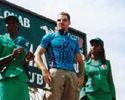 |
When we returned to the peloton Joost flatted and we brought him back as far as we could behind the car. But Joost had used a lot of energy in this chase. In the last kilometre the group with Folkert got caught and Joost pulled the sprint for Lionel. Folkert, who was still fresh, took over and Lionel won with two bike lengths. Then Lionel sprinted further, rushing behind a billboard. Camera teams ran after him but turned away their cameras. Lionel already had problems during the race and had to loose his load immediately after the finish - maybe it even made him sprint faster.
The people of Burkina Faso celebrate
We really hoped on a stage win for Joost - this would attract some extra attention in the Dutch media and Joost would become a national hero in Burkina Faso forever.
But he was already a famous man; everywhere we went we heard people whisper "Lettenberch". So in the last stage of the Tour du Faso, which finished in the capital, Ouagadougou the team worked completely for Joost.
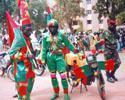 |
The peloton stayed together and arrived at the finishing circuit in the centre of town that had to be completed four times. Thousands of people were waiting for the Tour to arrive. When the first cars arrived the spectators got really excited, but policemen made sure the roads stayed clear. When the cyclists arrived people were clapping, shouting and singing.
During the final four laps, many riders tried to get away, encouraged by the loud cheering of the spectators. But the speed was so high that nobody could get away. So it came down to a field sprint. Folkert brought Lionel and Joost to the front. Lionel is the faster sprinter, but he already won two stages and we choose to go for a stage win for Joost. Lionel pulled the sprint and Joost came over him with 100 metres to go. But the Burkinese also created a great lead-out and at the finish line Sa Dou Rouamba beat Joost.
The spectators were going crazy and broke through the cordon of policemen. First the bicycle of Roumamba was flying in the air above the crowd, then also Rouamba was thrown up in the air all the time. This was a national celebration in Burkina Faso.
Four big trophies
In the evening the Tour du Faso was ended with a closing ceremony. On two big stages the officials held their speeches and the artists did their performances. These stages had been used all Tour for the parties in the finishing cities. Winners of stages and classifications received really big trophies. Lionel had to go four times, for his two stages, the points and the sprint classification.
In the morning we left for the airport. A big line of people was already waiting. We also joined the line and were standing outside the airport. A few hours later we moved up to the check-in and one hour later we could go for boarding. So with about four hours delay we flew back to Europe; a great African adventure in our memories.
The Marco Polo Cycling Club are be looking out for talented African cyclists, and we hope to have some strong African riders in 2003 in the Marco Polo Cycling Team, Trade Team 3. The team can still do with sponsors or other financial support to make this possible.
Photography
Images by Remko Kramer
- Abdoulaye Ouedraogo, our Burkinese cyclist, suffered in the heat and was happy to cool down after the stage.
- The Marco Polo Cycling Club in Burkina Faso, Africa.
- The Burkinese people love cycling and the Tour du Faso is the most important sporting event in the country. Here you can see some men totally dressed up in the national colours of Burkina Faso.
- Lionel in the pink sprint jersey, with Abdoulay relaxing in the sun before the start.
- Lionel on the podium ready to receive the green points jersey after winning his second stage; he doesen't wear his cycling shorts anymore because his stomach had also been sprinting this stage.
More information on the Marco Polo Cycling Club and its travels: www.worldwidecycling.com
